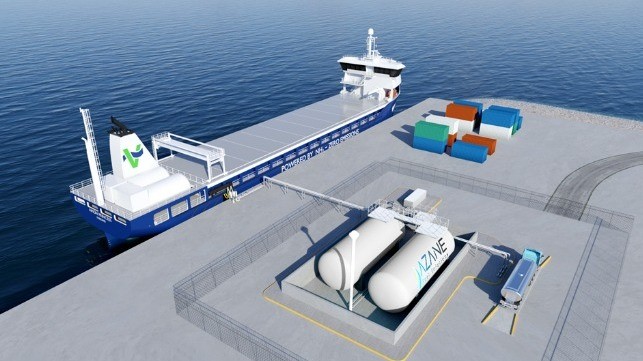China Shipbuilding Hengyu Energy (Shanghai), a subsidiary of China State Shipbuilding Corporation (CSSC), has completed the bunkering of three methanol-powered product tankers built by Guangzhou Shipyard International.
The 49,900-ton tankers were fueled with a total of 240 tons of methanol, a major milestone for the Chinese methanol fuelling track record.
CSSC Hengyu Energy has been active in the field of new energy marine gas/ship fuel bunkering business since January 2020. It started looking into the methanol bunkering potential in October 2021, seeing that it is rapidly developing into the most feasible, low-carbon, and low-cost alternative to conventional marine fuel.
Methanol bunkering is still in its early stages of development, with very limited industry regulations in place across the globe. Hence, CSSC sees the development of its onshore methanol bunkering equipment combined with the group’s engineering know-how as a major industry breakthrough and a competitive advantage.
The methanol bunkering system itself comprises an unloading hose that transfers pressurized methanol in liquid form to the receiving ship via a ship-to-shore connection. The filling station can work on two tankers simultaneously and its maximum filling capacity is 60 tons/hour.
CSSC Hengyu Energy is currently working on the compilation of the “Guidelines for Methanol Fueling of Ships” and the related standards with the aim of building the technical level of expertise related to bunkering operations and accelerating the development and uptake of methanol-fuelled ships.
Guangzhou Shipyard International Co Ltd (GSI) has been hired by Proman Stena Bulk, a joint venture (JV) between methanol producer Proman and Stena Bulk, to build six IMOIIMeMAX dual-fuel MR tankers powered by methanol. The shipbuilder delivered the first one, Stena Pro Patria, to its owner in June 2022, followed by the delivery of Stena Pro Marine in July.
Tags: Bunkering, CSSC, Methanol



Recent Posts
Babcock’s LGE Business Secures Contract for Marine Ammonia Fuel System to Advance Shipping Decarbonisation
Associated Terminals Deploys Liebherr’s All-Electric Cranes in Landmark Move Toward Cleaner Cargo Handling
Sanmar delivers fully electric emissions-free tug to major global operator Svitzer
Kolkata Dock deploys first-ever electric mobile cranes
ONGC orders two ethane carriers from Mitsui O.S.K. Lines
IndianOil to Commission India’s Largest Green Hydrogen Plant by 2027
IMI Greater Noida Signs MoU with IME (I) to Launch A New Student Chapter
GCMD Completes World’s First Pilot Demonstrating Full Carbon Value Chain from Ship-Captured CO2 in China